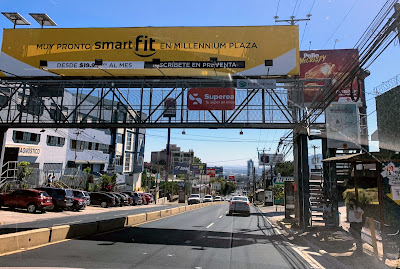 |
| Typical pasarela in San Salvador. |
I am maybe a little bit obsessed with pasarelas. This is the second time I am writing exclusively about pasarelas. My husband thinks I am weird because I take pictures of pasarelas while we are driving, and I have been known to stimulate our car conversation with an enthusiastic "Rats, I missed it! Did you see that pasarela?"
My husband's response is usually a dull, "What?" as I twist myself around toward the rear window to try to grab a picture of a flight of pasarela stairs as we whiz by.
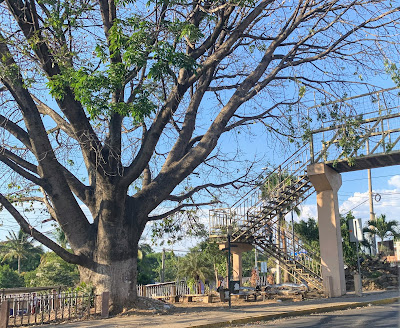 |
| Typical flight of stairs up to a pasarela. |
For those who may not know, "pasarelas" are pedestrian bridges which cross over busy roadways. Why do I notice them? I am a sort of nerdy engineer-type, but mostly, I think it's because Salvadoran pasarelas are almost by nature, ridiculous. A few weeks ago, I mentioned to my husband that I might write another pasarela story. I think he said "whatever" or "why" and clearly did not show enthusiasm.
A few days later, a friend came over for dinner, and in the course of our pre-dinner chit chat, we ended up talking about pasarelas (as friends naturally do). When I mentioned that I have some new pasarela photos and was thinking of writing a pasarela update, my friend was 100% behind that idea. Then she shared a crazy story of how she was taking pictures of a particularly amazing pasarela and ended up driving down a flight of stairs (which, to be clear, was not a road). Yeah, that's pretty extreme. But the pasarela in question really is somewhat epic.
 |
The multi-segment pasarela at the Masferrer roundabout.
(Scene of the stairs incident.) |
The traditional pasarela construction design consists of flights of stairs on either end of a footbridge which spans the width of the roadway. The idea is to provide the pedestrian with a safe way in which to cross busy streets, especially where the traffic is heavy, moves at a high rate of speed or where barriers impede the crossing of the roadway at street level. On most roads, the height of the pasarela is made to accommodate truck traffic, so the number of stairs which pedestrians need to climb can be substantial, as illustrated in the classic pasarela photo below.
 |
| Pasarela located on Constitution Ave, in the area sometimes called Calle de Oro. |
From the rickety, rusty pasarelas in Ciudad Delgado to the massive concrete pasarela bastions along the highway, pasarelas have one purpose: to make it
safer (which does not mean easier) to cross El Salvador's busy thoroughfares. Most pasarelas have stairs, lots and lots and lots of stairs.
Since writing
my first pasarela story, I have taken note of some developments in the world of Salvadoran pasarelas. Along the Lateral Highway in the southern part of the country, road construction brought with it a new pasarela design. This design replaces the stairs with ramps, which on the surface seems to be an improvement in accessibility. However, the steep grade on these concrete ramps is insane! I cannot imagine trying to wheel myself or a loved one in a wheelchair on these things. Even controlling a baby stroller would be a risky trick. If the coast were clear, even this pasarela-lover would be running across the road to cross the highway at this point.
 |
| New pasarela on the Carretera Litoral |
Perhaps some feedback on the high ridiculous level of the previous pasarela design helped to inform the planning process for the construction of pasarelas along the new highway to La Libertad. The switchback design makes the grade on the access ramps appear to be a little more manageable, especially for pulling or pushing wheeled objects. For a person who has difficulty walking, the ramps add quite a long distance to navigate in order to cross the road. On this highway, there are also marked crosswalks and breaks in the center concrete barriers which are located in fairly close proximity to the pasarelas. This seems to send a mixed message to pedestrians. Perhaps the pasarelas are favored at nighttime, but during daylight hours, we have only observed pedestrians using the crosswalks*, and not the pasarelas.
 |
| Check out these ramps on the pasarela on the new highway to La Libertad. |
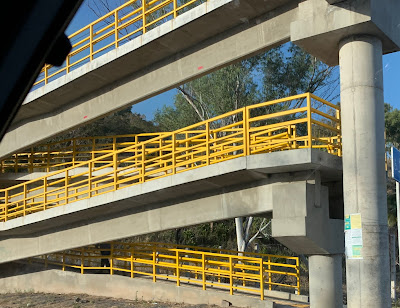 |
| The yellow paint adds a nice aesthetic touch |
Returning to that epic pasarela at the Masferrer roundabout, it really does seem more like a tourist attraction than a practical way for pedestrians to navigate this humungous intersection. Before the roundabout was redone, I actually walked this way frequently, and it was tricky to cross unless the traffic was completely stopped due to heavy congestion (which was common). Otherwise, we had to walk to the next block and cross at a light. This new pasarela has long ramps, lots of stairs, and an elevator. Although from an accessibility standpoint the elevator is a good addition, media surveys of nearby residents indicate the elevator is not ordinarily functioning.
 |
| This pasarela at the Masferrer roundabout is both cool and ridiculous. |
Pasarelas definitely do function in some settings. I have used them and been glad for them when crossing busy, multiple-lane streets. I have climbed up to check out the layout of the neighborhood to figure out my walking route. I have used them to avoid creepy situations. I have enjoyed watching traffic and taking photos from up top. I have taken many, many photos of political banners and funny food advertisements while driving down below. And, I have uttered the words, "Seriously, look at those stairs!" many, many times. And that is the point which I want to make to conclude this story.
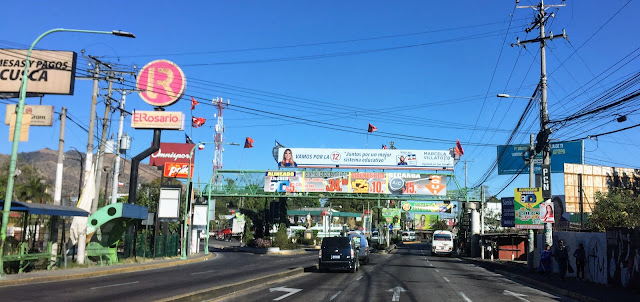 |
| The traditional-style pasarela in Apopa |
My friend, Julia, has a lot of health issues. She faints. She falls. She gets tired really easily. She recently was scheduled for physical therapy appointments in Apopa. In order to get there, she has to take the bus, which requires her to be accompanied and doubles the cost of the bus ride. Once in Apopa, she has to cross the street to get to the clinic. That means crossing the Troncal: 4 lanes of traffic with a barrier in the middle. Julia said, "I have two options. I can use the pasarela and have help to climb the stairs. It takes me a long time because I have to rest. And, I am afraid of the stairs. By the time I get to my appointment, I will be too tired to do the therapy. Or, I can run across the street." She laughs, "No, I can't run across the street. When my grandson takes me he says, 'No, abuela, it's too dangerous to go across the street.' So for the first appointment, my grandson took me and we used the pasarela. I was late and too tired for therapy, so we just came home."
 |
The new pasarela in Apopa - connecting Plaza Mundo with the parking area.
Mall and business pasarelas typically have functioning elevators.
|
For folks who rely on the buses and their feet to get to where they need to be, pasarelas can be helpful. But for people who struggle to walk or use a wheeled device for themselves or their family, pasarelas are not helpful. Realistically, most pasarelas are pretty useless, and pretty ridiculous. Most people pass them by.
So, not to end on a negative note, here's a tangential story. Near Metro Centro in San Salvador, there are a couple of entrepreneurial guys who will help you to cross the street safely at a busy intersection. They wear reflecting vests and prevent cars from turning into you when you have the right to cross. For their service, you can pay a little something. In the urban areas, the idea of crossing guards or traffic police that actually help pedestrians is not ridiculous. For what it cost to build those really big highway pasarelas or the epic tourist attraction pasarela, the government could put some helpful people to work. Just a thought.
 |
| Check out the ramp on this pasarela on the exit to El Congo. |
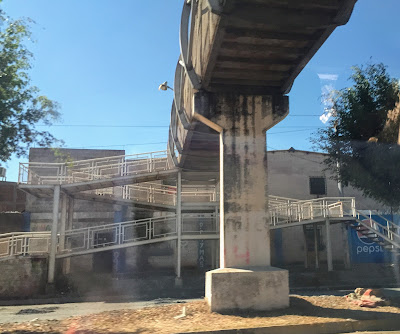 |
See the stairs? This is the same pasarela as the previous one
and is one of the few which has a combined ramp and stair design.
I promise, this is the last pasarela pic.
Well, until I see something really, really ridiculous. |
*My husband read this sentence about pedestrians crossing in the crosswalks instead of using the pasarelas and said (in a voice that was not dull), "yeah, crosswalks, or wherever the $#%@ else they want to cross." He's so supportive.















You composed this post cautiously which is beneficial for us for pedestrian bridges. I got some different kind of information from your article and I will suggest reading this article who need this info. Thanks for share it.
ReplyDelete